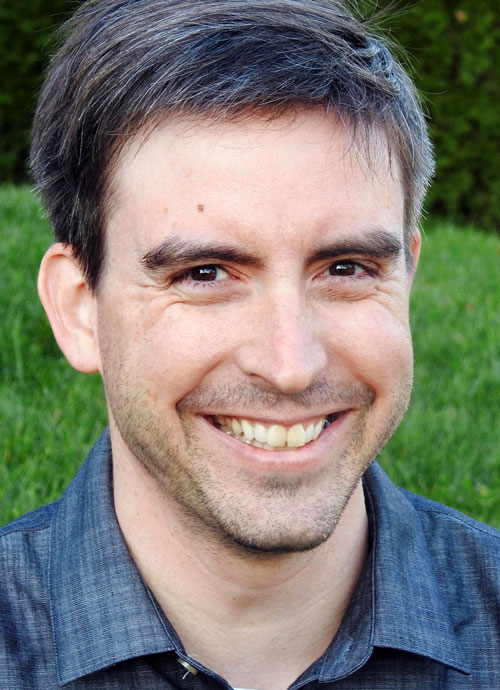Obituary: Michael E. Hughes, assistant professor of pulmonary medicine, 41
Neuroscientist advanced understanding of body’s biological clock

Hughes
Michael Evan Hughes, PhD, a neuroscientist and chronobiologist highly respected for his research at Washington University School of Medicine in St. Louis, died Tuesday, May 4, 2021, at his home in St. Louis after a six-year battle with brain cancer. He was 41.
An assistant professor in the Division of Pulmonary and Critical Care Medicine, Hughes was married to Jing Hughes, MD, PhD, an assistant professor in the university’s Division of Endocrinology, Metabolism & Lipid Research. Together, they had three daughters: Sophie, 12; Quinn, 9; and Carolyn, 6.
“Michael was a smart and creative scientist, as well as a terrific teacher and mentor, both at Washington University and in the larger scientific community,” said Victoria J. Fraser, MD, the Adolphus Busch Professor of Medicine and head of the Department of Medicine. “He was an absolute joy to be around. We will all miss him deeply.”
Hughes opened a lab at the School of Medicine in 2017 and became an expert in circadian genomics, stemming from his research on the 24-hour sleep-wake cycle during healthy and diseased conditions.
He spearheaded efforts to establish standards for data collection, analysis and sharing in circadian biology and medicine. He collaborated with scientists nationwide on initiatives that included respected studies of skeletal muscle biology and function in aging and chronic disease. He helped develop JTK Cycle, a widely used algorithm that collects large-scale genomic data on biological rhythms. Hughes also helped lead the Hope Center for Neurological Disorders Clocks & Sleep Club, which promotes research on biological cycles and sleep in neurodegenerative diseases.
“Michael was a world-class scientist who made seminal contributions to the understanding of how time and time-related genes — the so-called biological clock — can impact health and disease,” said Michael J. Holtzman, MD, the Selma and Herman Seldin Professor of Medicine and director of the Division of Pulmonary and Critical Care Medicine. “Those who knew him were dazzled by his capacity for outstanding work while still devoting himself to family and battling a devastating illness with fearless and frank resolve.”
Hughes wrote an engaging and candid blog about living with brain cancer. After he was diagnosed with recurrent glioblastoma in spring 2020, he used the blog to sort through emotions. “This diagnosis and the one before it, the first emotions were anger and frustration: anger at cancer, myself, the doctors and any innocent bystanders that happened to be nearby. I wanted to scream: ‘Not [expletive] fair,’ but I obviously can’t do that with my kids in the next room. Sometimes this verged on despair, although when I rhetorically asked myself ‘Why me?,’ my imagined tumor shrugged and said ‘Why not?’ ”
Jing called her husband an “accidental scientist.” He started as a political science major while they were undergraduates at Stanford University during the late 1990s and early 2000s. “That is, until he decided to court a premed student — me — and switched his major to biology to impress her,” she said. “He never looked back, and I’m still impressed by him.”
He earned a PhD in neuroscience from Harvard Medical School in 2007. He completed postdoctoral training at the Perelman School of Medicine at the University of Pennsylvania in 2009 and Yale School of Medicine in 2013. He then joined the faculty at the University of Missouri-St. Louis before joining Washington University School of Medicine in 2017.
His “piercing intellect” was reflected in his wide range of talents and interests, his wife said. He was an accomplished golfer and a lover of nature documentaries, and had been a champion debater at Shawnee Mission East High School in Prairie Village, Kansas, where he grew up. He was a voracious reader who enjoyed maritime novels and always carried a book. He was intensively competitive. “The only things he ever lost to me were speaking French and making cookies,” Jing said.
Once Hughes became a father, however, doting on his daughters became a favorite activity. He once let Sophie paint his toenails with a glitter pen. He rescued Quinn’s beloved stuffed raccoon, Percy, after it fell off a hotel room balcony. He collected “magic rocks” with Carolyn.
Hughes also wrote his daughters letters that expressed fatherly pride and often repeated the same advice to each daughter: “Someday, someone is going to love you as much as I love your mom. If they’re a good person, love them back. Meeting your mom has been the defining event in my life, and everything good that’s happened to me, personally and professionally, has been triggered by knowing her. She makes me a better person.”
In addition to his wife and daughters, Hughes is survived by his parents, Nancy and Richard Hughes; and his sister, Laura Hughes.
A public celebration of life will be held from 4 to 8 p.m. Saturday, May 8, at Kriegshauser Mortuary-West Chapel, 9450 Olive Blvd., Olivette, Mo. Rolling attendance will be limited to 50 people at a time. Interment will be at a private ceremony in Overland Park, Kansas.
Memorial contributions may be made in care of Jing Hughes to the Hughes Children Education Fund at First Community Credit Union.







